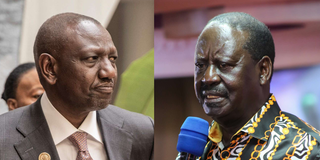
President William Ruto and Azimio leader Raila Odinga.
A parliamentary committee has dealt a major blow to President William Ruto and Opposition leader Raila Odinga after rejecting a number of proposals contained in the National Dialogue Committee (Nadco) report.
The National Assembly Committee on Justice and Legal Affairs, in its report tabled in Parliament while considering the Constitution (Amendment) Bill, 2024, a key Bill in the Nadco report, has rejected the creation of an official position for the leader of the opposition, saying such a proposal requires a referendum and cannot be done through Parliament.
The Constitution (Amendment) Bill, 2024 deals with issues such as elections, entrenchment of state offices and funds in the Constitution, vacation of office by an MP, declaration of presidential election among others.
The Nadco report was a product of bipartisan consensus between President Ruto and Mr Odinga following sustained anti-government protests and made a myriad of proposals touching on legal and policy reforms and issues of concern to the people of Kenya.
Among the bills that emerged from the report are the Constitution of Kenya (Amendment) Bill, 2023, which, if passed by Parliament will change the structure of government. The bill seeks to introduce the office of the Leader of the Official Opposition and enshrine in law the office of the Prime Minister, the Senate Oversight Fund, the National Government Affirmative Action Fund and the National Government Constituency Development Fund (NG-CDF).
Read: Same monkeys, different forest: The Ruto, Raila alliance and the gimmicks that sustains brotherhood
In its report, the Committee states that the constitutional entrenchment of the position of the Leader of the Opposition goes to the supremacy of the Constitution, the sovereignty of the people, national values and principles of governance and therefore requires a referendum.
The committee poked holes in the proposals, saying there was no institutional framework for creating the office and that it wasn't clear whether it would be a public or a state office.
The committee also questioned where the office would be located and under which branch of government it would fall.
"The establishment of such an office in Kenya's current system of governance must be clearly defined in terms of its institutional framework and role," the report said.
The committee noted that the proposal undermines the current presidential system of governance.
"The Constitution does not envisage a member of the Executive sitting in Parliament as implied in the proposed Nadco Leader of the Opposition Bill. This will lead to a change in the system of government, a decision reserved for the people," the report said.
The Committee pointed out that under Article 108 of the Constitution, the Minority Leader of the National Assembly is essentially the Leader of the Opposition in Parliament and that the creation of the Office of the Leader of the Opposition alters the functions of Parliament and must therefore be subject to a referendum.
The proposal to create the Office of the Leader of the Opposition was intended to provide a soft landing for a poll loser who comes second in a presidential election, thus somehow addressing the winner-take-all scenario that has been attributed to post-election chaos.
To address the thorny issue of inclusiveness and post-election cohesion in a winner-takes-all mentality, the committee says the country should reconsider the current presidential system.
"A parliamentary system is more inclusive as argued in the findings of the Committee of Experts as captured in its report on the review of the Constitution," the report said.
The committee also rejected a proposal to amend Article 102 of the constitution so that Senators would be elected after seven years instead of five.
The proposal also sought to stagger elections by holding the presidential election on a different date from those for members of the National Assembly, governors and county assembly members.
The committee noted that elections in the country are already expensive and therefore staggering them will add to the burden on taxpayers.
"Kenya's general elections are among the most expensive in the world. This is due to, among other things, foreign printing of ballot papers and the high cost of administrative infrastructure. Conducting two general elections will double the cost of the elections…to ensure cost-effectiveness, the elections should be held on one day," the report says.
A move to make state officials obey and promptly comply with court orders by amending the constitution was also rejected by the committee, which argued that the proposal was contrary to the doctrine of separation of powers as enshrined in the constitution.
"The committee was of the view that the proposal would interfere with the independence of the three arms of government, including the judiciary," the reports said.
Recently, the acting Inspector General of Police, Gilbert Masengeli, defied seven orders from the High Court in Nairobi to explain and testify about the alleged abduction of three men by police officers.
The committee also rejected a proposal in clause nine of the bill to include deregistration from a political party as one of the circumstances under which an MP's seat can become vacant, saying that parties in the country were not as democratic as envisaged and that the proposal could therefore be abused.
"Considering that MPs are elected by the people, the committee was of the view that the proposal gives party leaders expressive powers that are prone to abuse. This would breed dictatorship and undermine the will of the people, as the right of recall should only be exercised by the people and not by political parties," the report said.
The committee said the current legal provisions were sufficient to promote loyalty and discipline in political parties.
However, the committee's proposal was opposed by Rarieda MP Otiende Amollo, who argued in a minority report that the current legal provisions in Article 103 (1) (e) have hindered the realisation of true party discipline.
"The existing legal provisions have not adequately prevented members from associating themselves with other parties after general elections, thereby undermining the opposition and in turn weakening democracy," Dr Amollo said in the minority report.
However, MPs have given themselves power over boundary delimitation by supporting a proposal in Clause 4 of the Bill, which seeks to amend the Constitution by giving Parliament the power to extend the period for the review of names and boundaries beyond the prescribed period.
The report states that the extension will be made by a resolution passed by a majority of all members in the National Assembly and by the county delegation in the Senate.
Currently, Article 89 (2) of the Constitution requires the IEBC to review the names and boundaries of constituencies at intervals of not less than eight years and not more than 12 years, but any review must be completed at least 12 months before a general election of MPs.
"The committee noted that empowering Parliament to extend the period for reviewing the names and boundaries of constituencies beyond the prescribed period will ensure flexibility, promote fair representation and take into account unforeseen circumstances that may impede the delimitation process," the report said.
However, the committee adopted a proposal to prevent the IEBC chairman from announcing presidential results without verification by commissioners.
In the August 2022 general election, four IEBC commissioners led by former deputy chairperson Juliana Cherera, Justus Nyang'aya, Francis Wanderi and Irene Masit boycotted the final results announced by then-chairperson Wafula Chebukati, saying they had not verified the results.
They accused the chairman - and by extension their two other colleagues, Boya Molu and Abdi Guliye – of bulldozing his way through and sidelining them.
"The committee is of the view that the proposal is in line with court rulings that decisions of a commission must be taken by an absolute majority and not by individual members," the report said.
The committee also adopted a proposal to extend the time limit for hearing and deciding on presidential elections from the current 14 days to 21 days.
The committee also adopted a recommendation in the Nadco report to increase the minimum equitable share of national revenue allocated to county governments from the current 15 percent to 20 percent.






